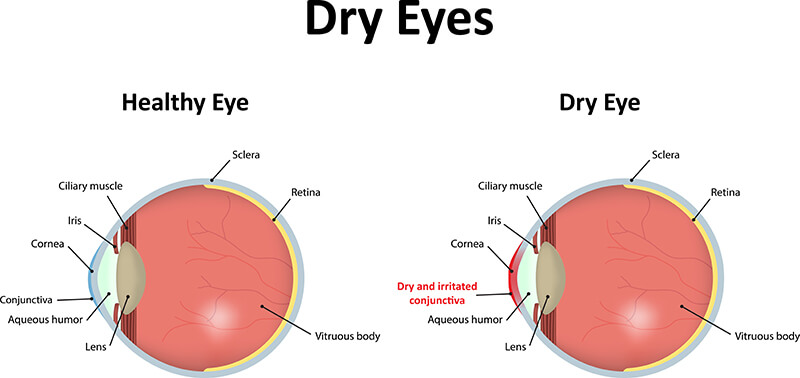Dry eye affects millions of patients. Mild dry eye may have few or no symptoms, but it is a chronic, progressive condition. If left untreated, dry eye advances to a more moderate or severe condition and can affect the quality of life. Vision becomes unstable and fluctuates, and eyes become too uncomfortable to read, use a computer or watch a movie. This can affect your ability to work or enjoy social activities. Some patients become self-conscious because their eyes are so red.

“Up to 12 million Americans suffer from a disease called dry eye syndrome.”
–American Academy of Ophthalmology
What are the types of dry eye?
Evaporative Dry Eye Disease – Inflammation of the meibomian glands located in the eyelids can cause this type of dry eye. Evaporative dry eye is a result of deficiency in the oily lipid layer of the eyes natural tear film. This is where the oily lipids protect the water layer of the eye from evaporation.
Aqueous tear-deficient dry eye is a disorder in which the lacrimal glands fail to produce enough of the watery component of tears to maintain a healthy eye surface.
What are the symptoms of dry eye?
Symptoms of dry eye vary but many include redness, burning, itching, gritty sensation, crusting and matting of eyelashes, sticky discharge, blurred vision, tired eyes and a heaviness of the lids. Patients may even complain of excessive watering of their eyes.
Dry eye treatments
Dry eye treatments vary greatly based on your symptoms and the root cause of your dry eye syndrome.
- Lubricating eye drops and ointments. Lubrication is key to keeping dry eye symptoms at bay. For people with mild dry eye, this treatment can be enough to avoid other treatments. For those with severe dry eye, drops and ointments are usually combined with more robust treatments. Eye drops are available without a prescription.
- Prescription eye drops. For those with more severe symptoms, or if over-the-counter drops don’t work, stronger medicated eye drops may be prescribed. Here at Boston Eye Group, we offer Restasis® and Xiidra® drops. Restasis® helps improve the root issue by helping your eyes produce more of their own tears over time. Xiidra® drops reduce inflammation by reducing the secretion of inflammatory cytokines.
- Punctal plugs. If drops and ointments do not work, the semi-permanent punctual plugs are another option. These tiny plugs are implanted into the drainage ducts in your eyes and keep tears from draining too quickly. This keeps tears in the eyes for longer.
If you have dry eye syndrome, there’s a good chance you may have Meibomian Gland Dysfunction (MGD) as well. Out of the millions of people that have dry eyes, 86% of them have some form of MGD.
Meibum, water, and mucus are the three layers that make up the tear film. You need all three of these components to have healthy tears and to keep your eyes moist.
Meibum, which is oil, keeps the water on the surface of the eye from evaporating too quickly. When you have meibomian gland dysfunction, it’s usually because the meibomian glands have become blocked.
If this happens, less oil can reach the surface of the eye. This leads to frustrating symptoms of dry eye syndrome and MGD.
What is TearCare?

For patients with dry eyes that suffer from meibomian gland dysfunction, TearCare is a blink-assisted device. It applies heat to the eyelids. This warms blockages caused by MGD and allows for their removal.
This is possible thanks to both wearable and smart technology. The underlying, root cause of your dry eyes is actively targeted while providing a comfortable, open-eye procedure.
TearCare uses SmartLids, which comfortably conform to the natural shape of your eye. The SmartLids are placed on the upper and lower eyelids.
This lets them deliver thermal energy across the full eyelid. The blink-assisted design allows your Boston Eye Group eye doctor to express the meibum. They will do this using a special pair of forceps. This is in no way painful.
Who is a Good Candidate for TearCare?
TearCare treatment is only meant for patients with meibomian gland dysfunction or blepharitis. You must be at least 22 years of age to safely undergo TearCare.
If you have other eye conditions, let your Boston Eye Group eye professional know ahead of time.
Want to learn more about TearCare and if this treatment could be right for you? Contact Boston Eye Group in Brookline, MA to schedule an appointment!
